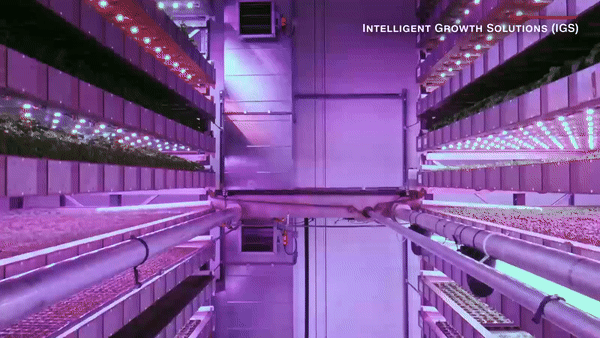The Arab Emirates surprised the world with the world's largest 'vertical farm'
In 2022, Dubai will put into operation a farm with an area of 31,000 square meters located on the grounds of Dubai's Al Maktoum International Airport . Here, people stack vegetable growing trays into towers, creating a vertical farm to produce green vegetables with minimal water and land. Up to now, this farm harvests more than one million kg of high-quality green vegetables each year.
However, this title is about to be overthrown. On the other side of the city, in a place called Food Technology Valley, people are preparing to put into operation a new facility called GigaFarm with an area of 83,612 square meters , nearly 3 times the size of the first vegetable farm. Rows of vegetables will be up to 12 meters high.

This farm is yielding millions of kilograms of vegetables every year.
GigaFarm is overseen by a company called ReFarm founded by the UAE. Not only is it much larger than other vertical farms, GigaFarm also has a different way of operating.
The United Nations says food farming causes one-third of global greenhouse gas emissions. To make agriculture greener, Oliver Christof, CEO of Christof Global Impact, the company behind ReFarm said GigaFarm uses technology that can turn waste such as wastewater and surplus food into agricultural products. industries such as compost, animal feed, clean water and energy.
By bringing farms closer to consumers and using more efficient production methods to reduce fertilizer use, the system promises to cut carbon emissions in food production. Productivity here can be up to 3 million kg of green vegetables per year, equivalent to 1% of the UAE's food imports.
GigaFarm's vertical farming solution is provided by IGS – a company based in Scotland. This system looks like multi-storey parking lots but with trees instead of parking. The growth environment is specially controlled while water and fertilizer are calculated in detail to achieve the highest efficiency.
Using a hydroponic system , each growing tray is lined with organic fertilizer or coconut fiber instead of regular soil. A special lighting system helps provide light for plants to grow like sunlight. Sensors and cameras are used to monitor plant growth. Vertical growing systems can automatically manage light, temperature, humidity, water and nutrients.
This vertical farming method helps plants grow quickly, reduces water use by 98% and takes up less space. In addition, farms can be built in areas where degraded land cannot be used for traditional agriculture or where businesses are limited by seasons and climate.
However, these vertical farms also have weaknesses that perhaps make them only suitable for. rich people. Accordingly, the initial investment cost is very large, operating costs are high and the amount of electricity consumed is not low. Many businesses following this model have gone bankrupt because they cannot balance costs.
To solve this problem, Dubai wants to take advantage of renewable energy and build a circular economy model to turn waste from other cycles into raw materials for planting trees. Energy for the farm is provided from burning solid waste while water is obtained from an insect-based waste treatment technology.
Specifically, black soldier flies will be raised to eat food waste. At the end of the growth cycle, they will be turned into high-nutrition animal feed. GigaFarm plans to recycle 50,000 tons of food waste annually, and the amount of water generated from the process is enough to operate vertical farms.
- The largest green farm in the world in the heart of magnificent Paris
- 4 farm-saving solutions for growing organic green vegetables
- Inauguration of the world's largest wind farm
- Build the world's largest underwater park in Dubai
- Video: High yield vertical vegetable farm in the US
- The remarkable vertical farm in the world
- Emirate of Dubai and special things in Dubai
- How to make artificial rain in the desert
- The world's largest vertical garden
- Japan built the world's largest wind farm
- The UAE records its name in the history of the ISS
- Operating the world's largest solar power plant
 Norway built the world's tallest wooden tower
Norway built the world's tallest wooden tower Kremlin
Kremlin Ashurbanipal: The oldest royal library in the world
Ashurbanipal: The oldest royal library in the world Decoding the thousand-year construction of Qin Shihuang shocked the world
Decoding the thousand-year construction of Qin Shihuang shocked the world